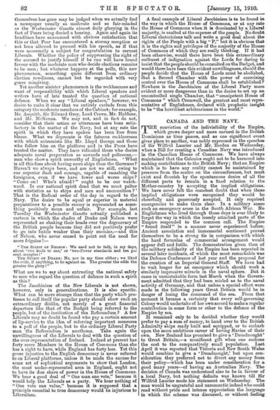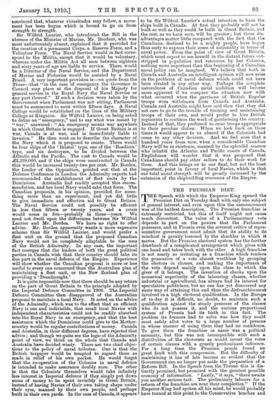CANADA AND 'nil, NAVY.
conviction of the indivisibility of the Empire, which grows deeper and more earnest in the British Dominions as time passes, and as one significant event gives place to another, was nobly expressed in the speeches of Sir Wilfrid. Laurier and Mr. Borden on Wednesday, when a Bill for creating a Canadian Navy was introduced in the Canadian House of Commons. We have always maintained that the Colonies ought not to be harassed into making contributions to the British Navy; that an Empire which is to have any reality cannot be maintained by pressure from the centre on the circumference, but must exist and flourish by the spontaneous desire of all the different parts to remain in a fixed relation to the Mother-country by accepting the implied obligations. We have never felt the remotest doubt that when these implied obligations were recognised they would be cheerfully. and generously accepted. It only required emergencies to make them clear. In a military sense such an emergency arose in the South African War. No Englishman who lived through those days is ever likely to forget the way in which the loosely attached parts of the Empire responded to the common call. The Empire " found itself" in a manner never experienced before. Ancient association and immemorial sentiment proved themselves to be a strong tie in comparison with which the hard formulae of commercial arrangement would appear dull and futile. The demonstration given then of the military solidarity of the Empire has been repeated in several later incidents, of which the most remarkable was the Defence Conference of last year and the proposal for the creation of an Imperial General Staff. We have had to wait longer for an emergency which should work a similarly impressive miracle in the naval sphere. But it came in unmistakable form last March when the Govern- ment admitted that they had been misled as to the naval activity of Germany, and that unless a special effort were made in the following years Great Britain would be in danger of losing the command of the sea. From that moment it became a certainty that every self-governing Colony would undertake of her own accord to make a regular contribution in some form or other to the defence of the Empire by sea. It remained only to be decided whether they would prefer to pay a sum of money, to hand over to the British Admiralty ships ready built and equipped, or to embark upon the more ambitious career of having Navies of their own. New Zealand has promised to give a 4 Dreadnought' to Great Britain,—a munificent gift when one reckons the cost to the comparatively small population. Last April it was reported that Victoria and New South Wales would combine to give a Dreadnought,' but upon con- sideration they preferred not to divert any money from their policy—which has been under consideration for a good many years—of having an Australian Navy. The decision of C'anada was understood also to be in favour of a local Navy, but nothing definite was known till Sir Wilfrid Laurier made his statement on Wednesday. The man would be ungrateful and unromantic indeed who could read without pride and intense appreciation the language in which the scheme was discussed. or without feeling ' convinced that, whatever vicissitudes may follow, a move- ment has been begun which is bound. to go on from strength to strength. Sir Wilfrid. Laurier, who introduced. the Bill in the absence of the Minister of Marine, Mr. Brodeur, who was most unfortunately absent, explained that it provided for the creation of a permanent Corps, a Reserve Force, and a Volunteer Force. The Naval Service would in fact corre- spond to the Militia, except that it would. be voluntary, whereas under the Militia Act all men between eighteen and sixty years of age are liable to service. There would be a Director of the Naval Service, and the Department of Marine and Fisheries would be assisted. by a Naval Board.. A very important provision is—we quote from the Times—that " in the case of emergency the Governor in Council may place at the disposal of his Majesty for general service in the Royal Navy the Naval Service or any part thereof." If such a decision were taken by the Government when Parliament was not sitting, Parliament must be summoned to meet within fifteen days. A Naval College would be established on the lines of the Military College at Kingston. Sir Wilfrid Laurier, on being asked. to define an " emergency," and to say what was meant by " war," answered : " An emergency means war anywhere in which Great Britain is engaged. If Great Britain is at war, Canada is at war, and is immediately liable to invasion." He then went on to describe the character of the Navy which it is proposed to create. There would. be four ships of the Bristol' type, one of the Boadicea ' typo, and six destroyers, to be divided between the Atlantic and the Pacific. The cost to Canada would be £2,338,000, and if the ships were constructed in Canada this would. be increased twenty-two per cent. Mr. Borden, the Leader of the Opposition, pointed out that at the Defence Conference in London the Admiralty experts had recommended the establishment of fleet units by the Dominions. Australia had readily accepted this recom- mendation, and her local Navy would take that form. The Canadian proposals, in his opinion, provided for some- thing more than an experiment, and yet did. little to give immediate and effective aid to Great Britain. The Naval Service could. not possibly be efficient in less than fifteen or twenty years, and a crisis would come in five—probably in three—years. We need. not dwell upon the differences between Sir Wilfrid Laurier and Mr. Borden. We have no right to offer advice. Mr. Borden apparently wants a more expensive scheme than Sir Wilfrid Laurier, and would prefer a fleet unit on the ground that the proposed Canadian Navy would not be completely adaptable to the uses of the British Admiralty. In any case, the important fact emerges that the leaders of both the great political parties in Canada wish that their country should take its due part in the naval defence of the Empire. Experience will show whether the Canadian proposal is more or less useful to every one concerned than the Australian plan of maintaining a fleet unit, or the New .Zealand plan of providing a Dreadnought.' It is quite impossible now that there should be any return on the part of Great Britain to the principle adopted by the Imperial Defence Committee in 1906. The Imperial Defence Committee then disapproved of the Australian proposal to maintain a local Navy. It acted on the advice of the Admiralty, which was to the effect that an efficient Navy is one and indivisible, that small local Navies with independent characteristics could not be readily absorbed into the Royal Navy in an emergency, and that the best assistance which the Dominions could give to the Mother- country would be regular contributions of money. Canada and Australia, in their different degrees, have rejected that advice ; and though we quite see the logic of theAdmiralty point of view, we think on the whole that Canada and Australia have decided wisely. There are two chief objec- tions to the policy of naval tributes. One is that the British taxpayer would be tempted to regard them as made in relief of his own pocket. He would forget that the co-operation of the Colonies in naval defence is intended to make assurance doubly sure. The other is that the Colonists themselves would take infinitely less interest in Imperial defence if they simply put down sums of money to be spent invisibly in Great Britain, instead of having Navies of their own taking shape under their eyes, manned by their own people, and perhaps built in their own yards. *In the case of Canada, it appears to be Sir Wilfrid Laurier's actual intention to have the ships built in Canada. At first they probably will not be built so well as they could. be built in Great Britain, and the cost, as we have seen, will be greater ; but those dis- advantages matter little compared with the fact that the Canadians, destined to be a mighty people, have begun thus early to express their sense of nationality in terms of naval power. From the point of view of Great Britain, which must expect to see herself in the distant future out- stripped in population and resources by her Colonies, nothing more important than this beginning of a Canadian naval policy can be imagined. We believe that both in Canada and Australia an intelligent opinion will now arise on the problems of naval defence which could not have been created in any other way. Perhaps the complete naturalness of Canadian naval ambition will become more apparent if we compare the situation now with what occurred. when the garrisons of British Regular troops were withdrawn from Canada and Australia. Canada and Australia might have said then that they did not care to go to the trouble of training and maintaining troops of their own, and would prefer to hire British regiments to continue the work of garrisoning the country. Instead of that, they preferred to raise troops appropriate to their peculiar duties. When we look back on those times it would appear to us absurd if the Colonists had come to any other decision. And we feel sure that a hundred years from now, when a considerable Canadian Navy will be in existence, manned. by the splendid seamen who inhabit the Atlantic and Pacific coasts of Canada, Englishmen will wonder that it was proposed that Canadians should pay other sailors to do their work for them. And this brings us to .our final, but not the least important, point in favour of local Navies, which is that our total naval strength will be greatly increased by the extension of the shipbuilding resources of the Empire.







































 Previous page
Previous page